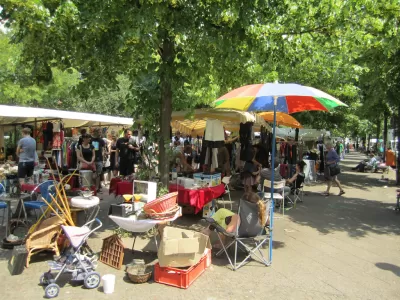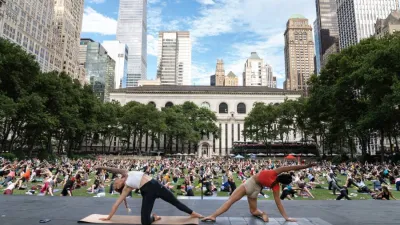With the support of its executive leadership, Adelaide, Australia's experimentalist city council has encouraged ephemeral projects to enliven streets. "Splash Adelaide" projects can even override council policy.

As CEO of Adelaide, Peter Smith presided over the city's distinct shift from staid and workaday to trendy. The city's placemaking program, Splash Adelaide, consists of "simple and inexpensive strategies for activating its public spaces. It started a few years ago with light-weight interventions such as shutting down a street to cars for a night, giving it over to food vendors and musicians, and giving those commuters a reason to linger after work."
Temporary rule-breaking has encouraged disruptive change: "Splash Adelaide projects could break any council policy, but not break the law [...] The idea was to 'consult by doing' and to get businesses and residents to think about shared spaces in new ways. Because the interventions were temporary and experimental, there was no huge risk."
Appropriately, Adelaide consulted with Gehl Architects to develop the plan. While Splash Adelaide has had success challenging "the notion that economic development happens through big, contentious projects," its open fairs and street retail have drawn criticism from heavily regulated traditional businesses.
FULL STORY: How Adelaide revitalized itself through ‘placemaking’

Americans May Be Stuck — But Why?
Americans are moving a lot less than they once did, and that is a problem. While Yoni Applebaum, in his highly-publicized article Stuck, gets the reasons badly wrong, it's still important to ask: why are we moving so much less than before?

Using Old Oil and Gas Wells for Green Energy Storage
Penn State researchers have found that repurposing abandoned oil and gas wells for geothermal-assisted compressed-air energy storage can boost efficiency, reduce environmental risks, and support clean energy and job transitions.

Placekeeping: Setting a New Precedent for City Planners
How a preservation-based approach to redevelopment and urban design can prevent displacement and honor legacy communities.

San Francisco’s Muni Ridership Grew in 2024
The system saw its highest ridership since before the Covid-19 pandemic, but faces a severe budget shortage in the coming year.

Colorado Lawmakers Move to Protect BRT Funding
In the face of potential federal funding cuts, CDOT leaders reasserted their commitment to planned bus rapid transit projects.

Safe Streets Funding in Jeopardy
The Trump administration is specifically targeting bike infrastructure and other road safety projects in its funding cuts.
Urban Design for Planners 1: Software Tools
This six-course series explores essential urban design concepts using open source software and equips planners with the tools they need to participate fully in the urban design process.
Planning for Universal Design
Learn the tools for implementing Universal Design in planning regulations.
Heyer Gruel & Associates PA
City of Moreno Valley
Institute for Housing and Urban Development Studies (IHS)
City of Grandview
Harvard GSD Executive Education
Salt Lake City
NYU Wagner Graduate School of Public Service
City of Cambridge, Maryland



























